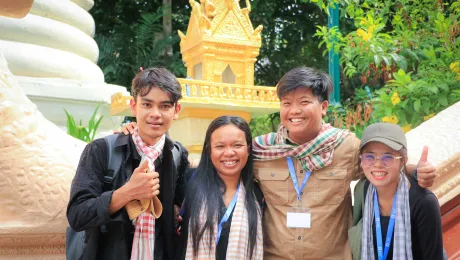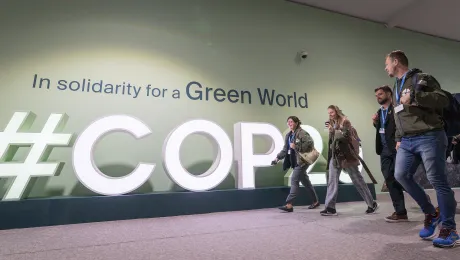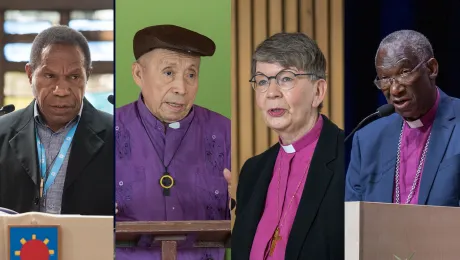Investing in youth innovations on climate justice and peace mobilizes global action for sustainable development. LWF’s delegation to UN forum showcased and urged engagement with faith communities.
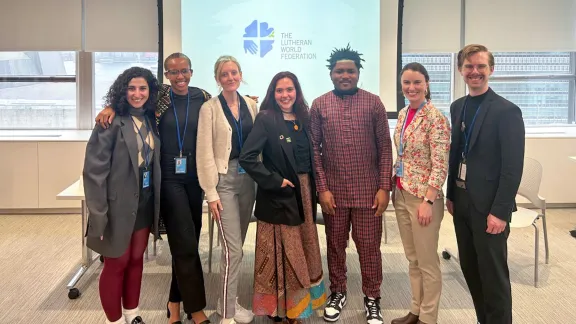
Panelists at the LWF side event at the ECOSOC Youth Forum: From left, Tamar Haddad (ELCJHL), Naomi Mbise (ELCT), Savanna Sullivan (LWF), Ingrid Kurtz (IELU), Wontoe T. Wontoe, (Liberia) Erin Brown and Kaleb Sutherland (ELCA). Photo: LWF/S. Sullivan
Youth-led initiatives champion intergenerational justice and sustainable futures at global forum
(LWI) – The Lutheran World Federation (LWF) took its first delegation to the United Nations (UN) Economic and Social Council (ECOSOC) Youth Forum with a core message: investing in young people now is critical to achieving sustainable development, and engaging with faith communities matters.
At a side event during the 16-18 April forum in New York, United States, the seven-person all-youth delegation shared experiences of youth initiatives that have moved communities to action, as part of Lutheran churches’ contribution to achieving the UN’s 2030 Agenda and sustainable development goals (SDGs). Participants discussed the connection between faith and care for creation, and the image of all equally created by God as inspiration for LWF youth-led initiatives around the world.
The Program Executive for Youth, Ms Savanna Sullivan introduced LWF’s three priorities for youth work: inclusive churches; youth leadership and intergenerational justice; and sustainable communities and entrepreneurship. She highlighted some of the small-scale projects initiated and led by youth across the member churches. This includes environmental protection through beach clean-up campaigns, training peace advocates at community level, advocating for inclusion of people on the margins, and raising awareness about poverty eradication, among others. In some cases, she said, governments have recognized youth for such leadership and included them in official delegations to global and regional climate conferences.
Churches and the 2030 Agenda
The theme of the 2024 Youth Forum was “Strengthening the 2030 Agenda and eradicating poverty in times of multiple crises.” This year ECOSOC is reviewing global commitments to five SDGs 1, 2,13, 16 and 17, namely no poverty; zero hunger; climate action; peace, justice and strong institutions; and partnerships, respectively. The LWF event focused on “Threads of Innovation: Investing in Youth-Led Programs to Achieve the 2030 Agenda Goals.” Panelists reflected on the barriers hindering implementation of SDGs, and the hopes they harbor for the younger generation.
We don't believe the church is a waiting room, it is the place that calls us to action.
Ms Ingrid Kurtz, United Evangelical Lutheran Church, Argentina
Ms Ingrid Kurtz, United Evangelical Lutheran Church (IELU) in Argentina, reflected on eco-justice and faith. She described how the national conservation policies make her native Missiones Province, bordering Brazil and Paraguay, a constant reminder of being part of nature. She spoke of growing awareness that “the land is not something that you own, but rather we, the community, are stewards of the crops and nature.” And, when the IELU youth organize river clean-ups in the capital Buenos Aires, it is encouraging to see that so many young people show up, she said. “I'm proud to say that Lutheran theology has always been closely related to social action. We don't believe the church is a waiting room, it is the place that calls us to action.”
Youth “carry the fire”
In the Israeli-Palestinian context, Ms Tamar Haddad, Evangelical Lutheran Church in Jordan and the Holy Land (ELCJHL), said she had not envisioned that her peace and justice work around the crisis would incorporate advocacy to eradicate hunger, in the current war involving Gaza.
The coordinator for women’s empowerment at Churches for Middle East Peace highlighted the story of a fellow ELCJHL youth, whose hopes in advancing an initiative in art technology have been dashed, and the connection to hunger among Palestinians. “When we linked up last, he was about to get married and had his house built. But in November, he sent us pictures of his house, now under rubble. Recently I saw a picture of him, he has lost half his weight. He doesn't look the same anymore.”
Still, Haddad is convinced that youth involvement in the social media movement for social justice, including access to food for people in Gaza, highlights the historic injustices that Palestinians face. “Youth can lead the way. We see them in the protests, risking their lives. Their role is very important; they carry that fire with them.”
All marginalized communities in mind
Kaleb Sutherland, director of the International Leadership Program at the Evangelical Lutheran Church in America (ELCA) focused on the role of faith-based networks in ensuring access to education and leadership, with a strategic emphasis on youth and women.

From left: Kaleb Sutherland (ELCA), Venesia Hutabarat (HKBP) and Ingrid Kurtz (IELU). Photo: LWF/S. Sullivan
He explained how ELCA youth questioning the exclusion of people of color and women in the leadership program highlighted the need to challenge racial injustice in decision-making processes across the church. “The outcomes were incredible and much more than we expected. While our target audience was young women, this equity-centered redesign resulted in unexpectedly positive outcomes, benefiting all stakeholders and demonstrating the broader societal impact of designing with marginalized communities in mind.”
The panelists included Mr Wantoe T. Wantoe from Liberia. Ms Naomi Mbise, Evangelical Lutheran Church in Tanzania, who welcomed panelists, and the event moderator, Ms Erin Brown from the ELCA, who is doing an internship with the Lutheran Office for World Community in New York. Brown thanked the speakers for underscoring the transformative potential of youth-led initiatives in addressing complex global issues.
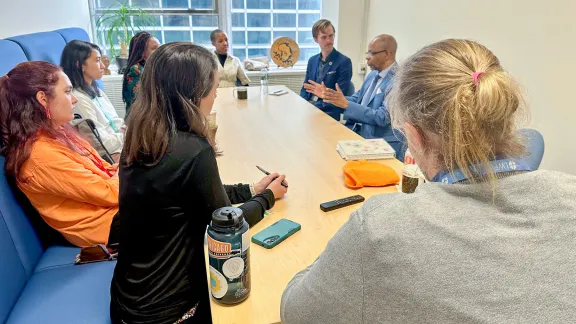
The LWF delegation in session at the ECOSOC Youth Forum, in this photo, a conversation with Mr Bernard Mabeba, Counsellor (Fourth Committee) Peace & Security at the Permanent Mission of South Africa to the United Nations. Photo:LWF/S. Sullivan
The ECOSOC delegation also included Ms Venesia Hutabarat from the Protestant Christian Batak Church (HKBP), in Indonesia. They participated in other sessions of the Youth Forum to affirm LWF’s commitment to inclusive decision making and proactive engagement across generations. Sullivan thanked the participants for articulating at a global level the Lutheran communion’s call for a more just and sustainable future.
